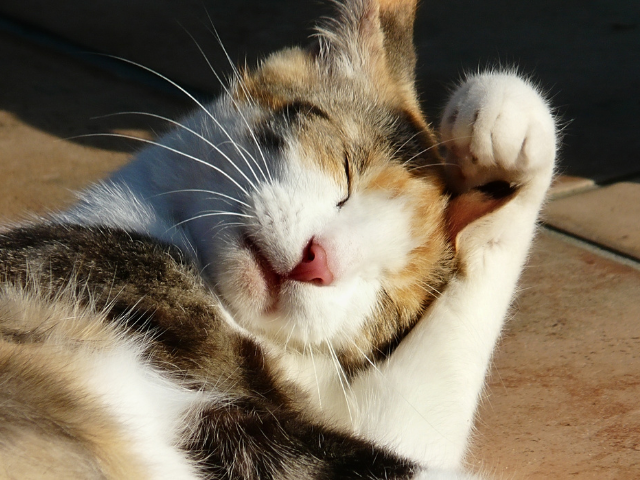Do cats really get hearing loss? What causes deafness in cats? It is known that healthy cats have strong hearing and are well aware of sounds. So if you feel that your cat does not respond to your call by name or is not affected by the loud sounds of door-knocking, or the house bell ringing, this is a clear indication that it suffers from weak or hearing loss.
Although cats are very intelligent, their hearing loss will affect their lives and intelligence due to their inability to respond to their surroundings. Your cat may also suffer from total or partial deafness in one or both ears. In both circumstances, you should consult a veterinarian. Without any further delay, let’s begin discussing the symptoms you may notice in a deaf cat.

What Are The Main Symptoms Of Deafness In Cats?
Of course, the lack of response to sounds is the most crucial symptom of deafness. So before looking for what causes deafness in cats, we will review the most common signs of deafness, including:
- Not responding to loud noises.
- Not waking up even if the sound is loud.
- Not responding when called by its name.
- Redness in the ears.
- Increased sleep.
- Loud meows.
- Your cat may show symptoms of heat.
- Bad smell from the cat’s ear, which indicates serious infections.
- The cat does not show fear when operating a vacuum cleaner or electrical appliances that emit loud sounds.
What Causes Deafness In Cats?
The types of deafness vary according to the cause that led to the lack of sound transmission to the cat’s brain. Your cat’s vet will help you find out the cause of the deafness in your cat and find the proper treatment for it.
The following are the causes of deafness in cats, which are:
- The inability of the sound to reach the auditory nerve is due to a blockage in the ear, which is called conduction deafness. Ear blockage may be caused by a buildup of wax, inflammation, or damage to the soft bones inside the ear. The vet will conduct a thorough examination of your cat and may need an X-ray to determine the problem.
- The inability of the auditory nerve to transmit sounds is called nerve deafness.
- Hearing decreases with age. As is the case in humans, cats’ hearing may decrease with age, as the internal structures in the ears lose their sensitivity to vibrations. Also, the thickness of the eardrum increases with age, which causes weakness or hearing loss.
- Deafness is caused by the presence of mites inside the cat’s ear, and the mite appears in the form of white dots inside the ear, which is the most common cause of deafness in cats. The vet will prescribe ear drops in this case, and your cat will recover and hear again.
- The presence of a tumor within the external ear canal of the cat. The tumor may be benign, and the vet treats it using anti-inflammatory drops or surgery. But the cure rate will be high if the tumor is not benign and is detected early.
- A ruptured eardrum. Your cat may have a ruptured eardrum, which has led to its hearing loss. A ruptured eardrum occurs due to loud noise or shock, and this condition is accompanied by symptoms that appear on your cats, such as dizziness, confusion, and secretion from its ear.
- A cause-related to the cat’s breed. If your cat has blue eyes and long white hair, it is more likely to become deaf, and this is due to a gene W present in this type of cat, which leads to deformities that lead to deafness.
- Some medicines affect the hearing of cats. Since we mention what causes deafness in cats, we must remind you that some antiseptics and medications that remove excess fluid from the body also affect your cat’s hearing.

How To Diagnose Deafness In Cats?
If you suspect that your cat suffers from hearing loss, you can do a simple test for it, clap for it loudly while it is meters away from you, and if it does not respond, this requires consulting a vet.
The vet will ask you for details about your cat, its health, the appearance of symptoms, and the events that preceded the appearance of this condition. Then, he will conduct a comprehensive examination of your cat’s body, including its ears, using an otoscope. The vet may have to anesthetize your cat if examining its ear is painful, and he may also need x-rays and MRI to confirm the condition of the middle and inner ear.
The veterinarian may order hearing aids for your deaf cat if the deafness is caused by damage to the inner ear, and if your cat is taking medications, the vet will ask to stop them because they may be the reason for her loss of hearing.
Why Your Deaf Cat Screams?
The difference between deaf cats and normal cats is the inability to hear sounds, so they scream and meow loudly to hear themselves. Also, the vibrations of deafness make her scream and meow loudly.
You can make your deaf cat stop screaming by distracting it by waving at it and using visual cues or laser light; this will train it to stop crying. Whereas if your cat is constantly screaming, this indicates that it has a problem or some pain.
How To Take Care Of Your Deaf Cat?
We have mentioned what causes deafness in cats, whether the deafness is congenital due to the breed of your cat, age-related, or pathological reasons. You are in front of a situation that needs care and proper attention. Although your cat is deaf, you can rely on the rest of its senses.
Cats are susceptible to vibrations. You can attract your cat’s attention by trampling on the ground firmly. And it will feel the vibration of the ground, and its sense of smell is strong. You can also rely on this point to deal with your deaf cat.
You can also rely on visual cues to deal with your deaf cat, such as making signals to it with your hands or using lights to eat or play with it, and with repetition, your cat will learn what those signals mean.
Of course, your cat’s weakness or hearing loss will affect its dealing with the outside environment, so try to keep it away from dangers, do not let it go out of the house unless accompanied by you, or keep it at home. You can also make a high external wall for the garden of the house so that it cannot jump out of it.
Also, you should be careful when approaching your deaf cat, so do not come to it from behind, but approach it before it not to panic. It is necessary to put a bell on the neck of your deaf cat so that you can easily locate it.

What Toys Can You Play With Your Deaf Cat?
Many toys stimulate other senses in your deaf cat. There is the game of light balls, and although your cat will not hear the sound of the balls hitting the ground. But it will see the light coming from the balls, stimulating it to move towards it.
Soft toys can be used, such as stuffed animals, and the feather stick is considered one of the best cat toys, especially for deaf cats, because it stimulates their sense of touch. And do not forget the laser pointer game that cats love so much.
How To Prevent Ear Problems In Cats?
We explained to you what causes deafness in cats, but you can prevent that. All you have to do is use ear cleaning products regularly and safely to keep your cat’s ears clean and prevent bacteria from growing in them. Still, deafness related to your cat’s breed, unfortunately, cannot be avoided or prevented.

Conclusion
In this article, we reviewed for you what causes deafness in cats, its symptoms and treatment, and how to deal with deafness in cats. If you suspect that your cat is deaf or is ignoring you, you can check its condition by shaking the box of biscuits or the bag of chips, and these sounds alert it well.
But if it does not respond to them, it means that it is really deaf, and you have to be prepared to deal with this deaf pet. Be patient and remember that your deaf cat does not know that it is deaf, so it is your role to be by its side, help it, and enjoy your time with it regardless of losing its hearing.
Also, your deaf cat can be wonderful and can live a happy life like any ordinary cat, and she may become more affectionate and loving, so feel free to reciprocate this feeling.

